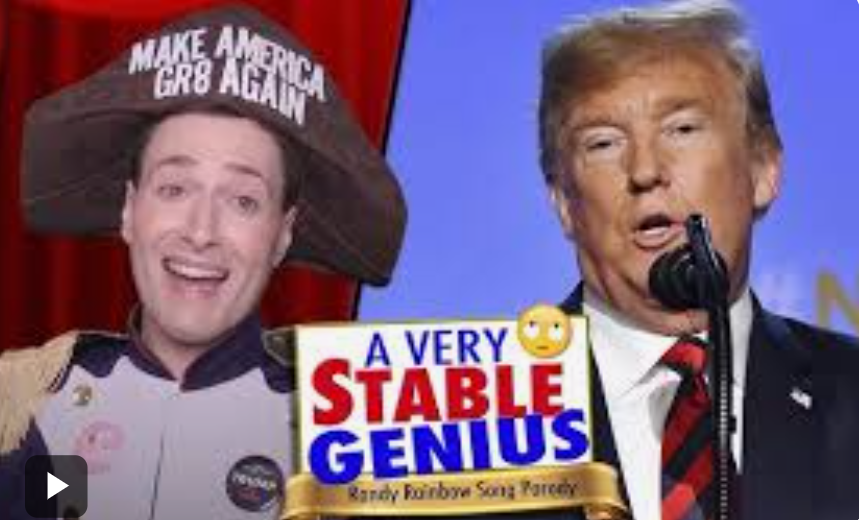In the world of narcissists every flaw is an asset, every weakness a strength. For Donald Trump, “the weave,” what many see as his disastrous rambling, frequent incoherence, and inability to stay on topic, become the oratorical strategy of a genius.
A few days ago, speaking at a rally in Johnstown, Pennsylvania, Trump rebranded his speaking style as “the weave.”
With his arms and fingers waving around, Trump explained, “You know, I do the weave. You know what the weave is? I’ll talk about like nine different things, and they all come back brilliantly together, and it’s like, friends of mine that are, like, English professors, they say, ‘It’s the most brilliant thing I’ve ever seen.’”
His rhetoric, often characterized as bombastic, populist, emotional, and antagonistic, has been a subject of extensive analysis by linguists, political scientists, and commentators. But what are the elements that go into making up what those who are not his fans call his rambling, his blabbering, or his word salad?
A linguist would tell you that Trump’s rhetorical approach is rooted in a populist political method that suggests nationalistic solutions to political, economic, and social issues. His use of language is marked by definitive terms such as “totally,” “absolutely,” “every,” “complete,” and “forever,” which serve to depict issues in black and white terms and to suggest that his ideas are shared by the majority–that is, that everybody agrees with him. He uses phrases such as “people always tell me” and “everybody knows.” When talking about his opponents and rivals, he invents insulting nicknames that are meant to humiliate them but also so that he can “brand them.”
Above all, he is known for his incomplete thoughts, digressions, fragments, and snippets of sentences that he will start multiple times without bringing them to completion. Most people would say this is just a lack of communication skill, a messy and disorganized mind– plain and simple. But for Trump who is the master of self-aggrandizement, this isn’t just hopping around conversational topics because of his inability to focus, it is a “weave” and he is a rhetorical genius. Previously he has called himself a “stable genius.”
The “weave” describes his method of interlacing various topics in a speech, which, despite appearing disjointed at times, can circle back and connect in a way that his fans may find effective, but leaves others scratching their heads trying to figure out how the discrete topics are connected—or even IF they are connected. Just recently he prattled on about electrocuted sharks, Hannibal Lecter’s cannibalism and Rosie O’Donnell (one of his pet peeves) all in one mega digression.

He is being roasted on talk shows. On “Morning Joe,” Scarborough and his guests had a field day mocking him for his transparently concocted explanation for his incoherence. Jonathan Lemire compared him to a bad “stand-up comedian with a multi-part act, bringing home the punch line three jokes later, referring to the old one, the callback.”
Timothy O’Brien, a Trump biographer, offered an insight as to why Trump feels compelled to invent a name for his rambling. “I highly doubt that Donald Trump has any English professor friends,” adding, “What this really reflects is that he is aware of the criticism that he is publicly saying nonlinear, nonsensical word salad, and he is trying to pretend there is a strategy or logic behind it when there isn’t.”
Trump is also known for making exaggerated (and frequently fantastical) claims about his abilities and is offensive about the failings of his opponents. Critics of his rhetoric argue that it can be dehumanizing and connected to physical violence by his followers, but there is no doubt that it is effective. Notice the way he whips up his supporters at rallies where they take up whatever chant he leads. “Lock her up!” “USA, USA!” “Fight, fight, fight!” He engages his audience through pathos—putting this in poor words, by pushing their buttons.
It has been suggested that his use of spectacular racist rhetoric and making outrageous claims serves to distract media attention from a lack of policy-making by igniting intense media coverage of the distractions themselves. If you have no policies to discuss then say something shocking and get the media talking about that instead. Republicans have been begging him to talk policy, and refrain from insulting his rivals, but Trump’s response has been that he is “entitled” to insult Kamala Harris’ intelligence, race and appearance.
His own campaign advisers are begging him to stay on script and on topic at a time when his campaign is suffering from inconsistency and confusion. He may want to rebrand the rambling and the inability to follow a thought to conclusion a weave, but we call it poor communication.
That “the weave” is a poor attempt to rebrand his mental confusion is obvious, but that he can go through a campaign without articulating a platform of policies and agendas, as he did in 2016 and as he is doing now, is indeed, a kind of genius.












